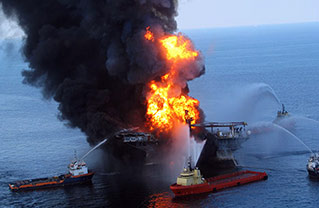FAYETTEVILLE, Ark.- Since the explosion of the Deepwater Horizon drilling rig six months ago, news from the Gulf of oil-slicked beaches and wildlife, of lives and livelihoods lost, has driven home the high cost of America’s thirst for oil. On Friday, Oct. 29, from 2:30 to 4 p.m., the University of Arkansas will gather a team of engineers, scientists, professors of law and history, and oil company executives to discuss the world’s largest accidental marine oil spill.
Cosponsored by the university’s College of Engineering and Honors College, The Gulf Oil Spill: Future Safeguards and Damage Assessment will take place in Room 2286 of Bell Engineering Building, located at 720 W. Dickson Street. The event is free and open to the public; parking is available in the nearby Harmon Avenue Parking Facility.
Colloquium participants will focus on the major questions raised by the Gulf oil spill disaster.
“What is the risk involved in extracting oil through offshore drilling, and at what point does the risk outweigh the value of the oil?” asked Ashok Saxena, dean of the College of Engineering, Distinguished Professor, and holder of the Irma F. and Raymond F. Giffels Endowed Chair in Engineering. “We also hope to explore the ultimate questions: Will the Gulf region recover fully from the disaster and how long might that take?”
The panel will address the factors leading to the disaster and what steps need to be taken to prevent future spills, including possible regulatory options and their costs.
“The Gulf oil spill raises large questions about the effectiveness or ineffectiveness of federal safety and environmental regulations in the oil industry. We hope to get those questions on the table,” said Bob McMath, dean of the Honors College and professor of American history.
Recognizing the expertise offered by alumni and campus professors, deans Saxena and McMath decided to organize this event soon after the disaster occurred. Saxena, himself an internationally renowned expert in predicting and preventing structural failures, and McMath, who has studied and taught about the evolving role of the federal government in regulating large industries, will act as moderators. They have assembled a crack team of experts offering diverse perspectives and experience, including:
- Ralph E. Martin, who earned bachelor’s and master’s degrees in chemical engineering from the University of Arkansas, founded PetroFac Inc. in Tyler, Texas, in 1981. The company provides facilities to the oil and gas production and processing industries and currently employs more than 12,500 personnel operating from more than 25 offices around the world.
- Ansel Condray, a 1964 chemical engineering graduate of the university, has held numerous leadership positions with Exxon Mobil Corp., the world's largest publicly traded international oil and gas company. He served as vice president, executive vice president and president of Exxon USA and became chairman and production director of ExxonMobile International Ltd. before retiring in 2003. [Editor’s Note: Ansel Condray has had to withdraw from the colloquium.]
- Marty Matlock, professor of biological and agricultural engineering at the university, brings expertise in biological assessment and monitoring, ecological engineering and ecosystem design and management to the table. Matlock has worked with students and professors on campus to estimate the economic impact of the oil spill’s damage to the Gulf of Mexico ecosystem.
- Stephen M. Sheppard, the William H. Enfield Professor of Law, teaches international and environmental law courses and serves as a faculty adviser, among other groups, to the Environmental Law Society. As a member of the bar in his native Mississippi, Sheppard continues to consult and advise area charities and governmental agencies. Following the oil spill he advised the Coast Guard and BP in technologies developed by NASA that related to the spill response and natural resource damage assessment.
The colloquium will conclude with a half-hour question and answer period and light refreshments.
“We hope to engage students and others in attendance in an open-ended discussion about this disaster and how to prevent a recurrence in the future,” said McMath.
“We are lucky to have people on campus and among our alumni who really know what they are talking about, who can shed light on this critical issue,” said Saxena.
Alumni Ralph Martin and Ansel Condray have been active supporters of the University of Arkansas. Martin made a $5 million gift to the College of Engineering in 2005 to endow the Ralph E. Martin department of chemical engineering. Ansel Condray received the university’s Citation of Distinguished Alumni in 1997 and has endowed the Ansel and Virginia Condray Professorship in Chemical Engineering. Both men are members of the College of Engineering Hall of Fame and have provided leadership as members of the College of Engineering advisory council and the College of Engineering committee during the Campaign for the Twenty-First Century.
Contacts
Kendall Curlee, director of communications
Honors College
479-575-2024,
